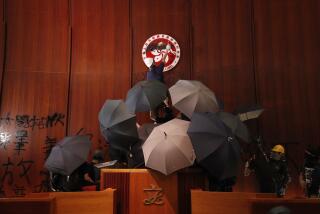Protesters Assail Curbs on Hong Kong Reforms
- Share via
HONG KONG — Thousands of pro-democracy demonstrators marched through central Hong Kong on Sunday in the first major protest against Beijing’s recent decision to dictate the pace of reform in the territory.
Organizers claimed that as many as 20,000 took part in the protest, which was directed at authorities in China and Hong Kong’s highly unpopular chief executive, Tung Chee-hwa. Police estimated the crowd at half that.
Many marchers shouted anti-Tung slogans and carried egg-shaped balloons painted with unflattering caricatures of the beleaguered leader. Although the protest was far smaller than the one that brought more than 500,000 people out last summer, the mood of Sunday’s action was more belligerent.
At one point, protesters shoved and jostled police, who had locked arms to block the marchers’ path as they neared the central government’s liaison office in an effort to deliver petitions against the mainland’s intervention. But police made no attempt to retaliate, and tempers eased after small groups were permitted to deposit the petitions at a rear entrance to the building.
“It’s a strong signal, especially to Tung, that the demand for greater democracy is still strong,” said Law Yuk Kai, director of the Hong Kong Human Rights Monitor.
No injuries or arrests were reported.
Sunday’s demonstration followed a controversial ruling last week in which Beijing in effect took control of the constitutional reform process that democracy advocates had hoped would allow the election of Hong Kong’s next chief executive in 2007 and the territory’s entire Legislative Council in 2008 through universal suffrage.
Under the ruling, issued by the Standing Committee of China’s National People’s Congress, any such change can now only begin once Hong Kong’s chief executive -- carefully selected with Beijing’s approval -- decides there is a clear need for it. Few of those pushing for greater democracy in the territory believe Tung would set the process in motion.
Under the agreement by which it reverted from being a British territory to Chinese sovereignty in 1997, Hong Kong enjoys limited democratic rights and considerable autonomy from the mainland.
Although democracy advocates have never disputed that Beijing would eventually have to approve major steps toward democratic reform in Hong Kong, they have long argued that residents had the right to decide when and how to start the process.
Leading democrats have denounced Beijing’s direct intervention as a preemptive strike that undermines Hong Kong’s mini-constitution, known as the Basic Law.
Beijing’s move was also sharply criticized by the U.S. and British governments.
More to Read
Sign up for Essential California
The most important California stories and recommendations in your inbox every morning.
You may occasionally receive promotional content from the Los Angeles Times.













